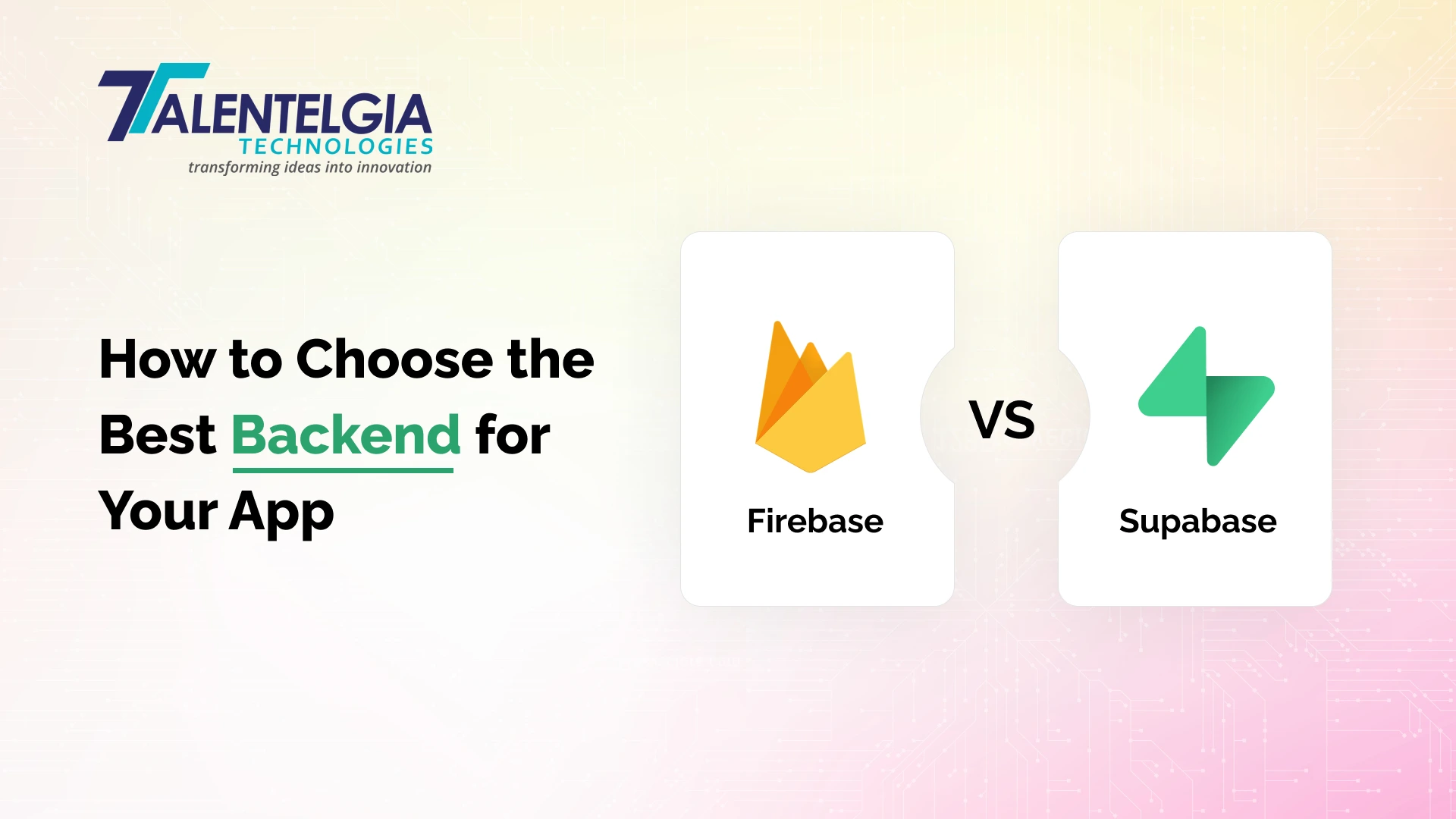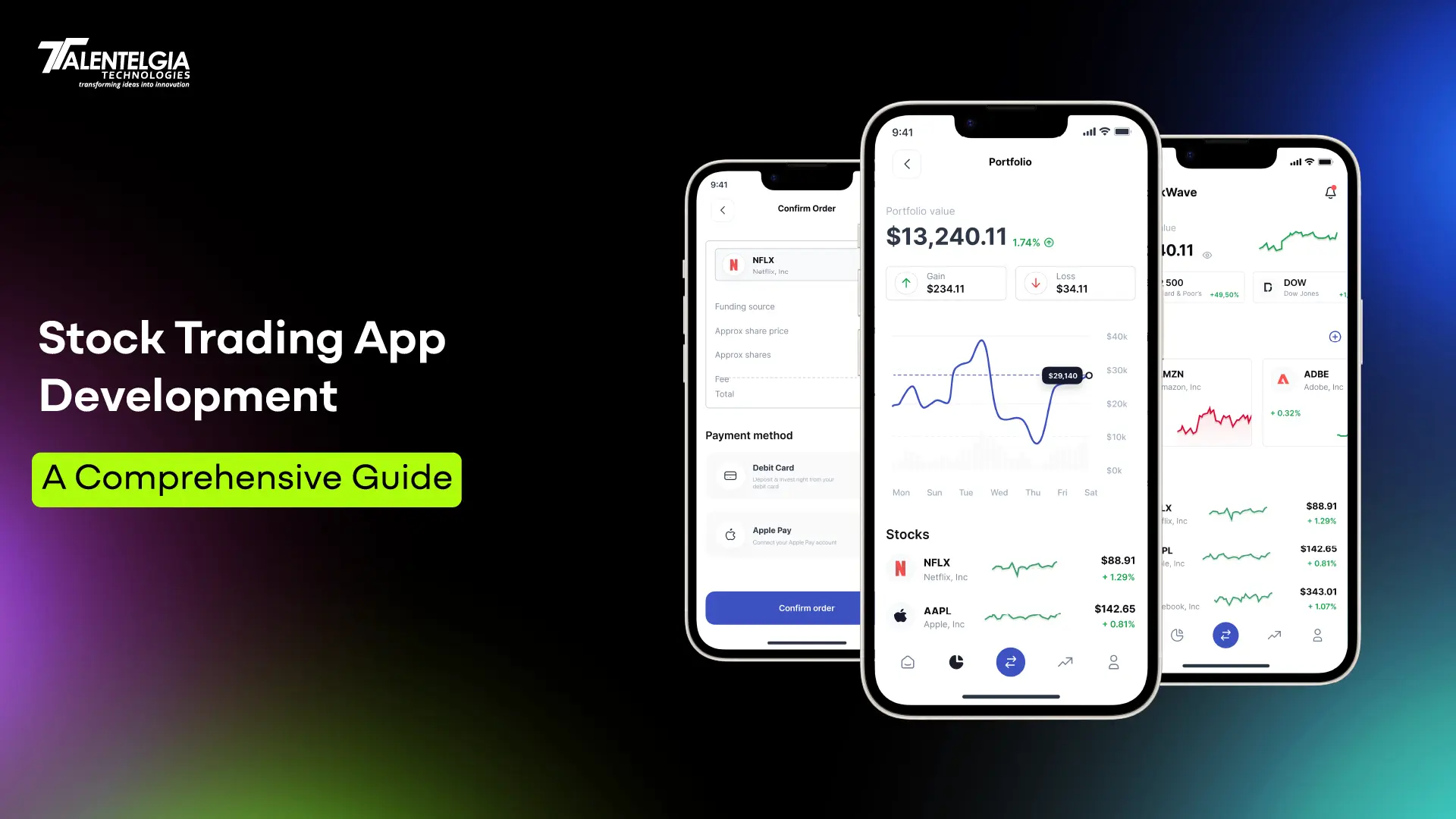Choosing an ideal backend-as-a-service (BaaS) platform is one of the most important choices you’ll have to make while starting your app development journey. With so many options, it may feel overwhelming. Firebase and Supabase are two of the most popular platforms nowadays. Each has unique advantages and features, making them ideal for a variety of tasks. In this blog, we’ll cover the fundamental differences between Firebase vs Supabase to help you make an informed choice that fulfills your app’s requirements.
A Brief Overview of Supabase and Firebase
Owned by Google, Firebase is an impressive competitor in the mobile app development space. It began as a basic real-time database and has grown into a comprehensive resource for developers. Firebase provides an advanced infrastructure for developing mobile and online applications, including capabilities such as Firestore (a NoSQL database), authentication services, cloud functions, and file storage.
But Supabase, a recently developed open-source Firebase alternative, takes advantage of the powerful relational database PostgreSQL. It attempts to offer comparable features but with additional flexibility over data management and the ability to self-host if needed for developers.
Comparison of Firebase vs Supabase
| Features | Firebase | Supabase |
| Database Type | NoSQL (Firestore, Realtime Database) | Relational (PostgreSQL) |
| Real-time Capabilities | Yes | Yes |
| Authentication | Comprehensive service | Comprehensive service |
| Serverless Functions (e.g.,AWS Lambda) | Cloud Functions | Third-party integrations |
| Open Source | No | Yes |
| Pricing Model | Pay-as-you-go based on usage | Free tier with data storage charges |
Understanding Database Management
How Firebase and Supabase handle data is one of their most important differences:
- Firebase: For unstructured data and flexible schemas, Firebase’s NoSQL document-based database is perfect. This flexibility can be helpful for projects that involve regular data structure modifications or for quick development. For example, Firebase makes it easy to add new data types to social media apps because users can upload information in various formats without needing costly database migrations. However, Firebase’s querying abilities could feel limiting if you need to do complex searches, like locating every user who is engaged with a particular post.
- Supabase: Through the use of PostgreSQL, Supabase is highly effective at handling complex SQL queries and structured data exchanges. Supabase would be a superior choice if your application involves complex data management, such as a financial app where precise links between transactions and users are essential. For example, Supabase’s relational model makes it easy to calculate user statistics and perform queries to generate financial reports.
Features for Authentication and Security
Both of these platforms provide reliable options for authentication:
- Firebase Authentication: Email/password, phone, and social media logins are among the methods that Firebase Authentication supports. Although this strengthens security, the way it integrates with Google services may strengthen ties within the Google network. For example, this integration could simplify managing users but may limit flexibility if your app’s primary user base is Google Suite members.
- Supabase Authentication: With the added advantage of being open-source, Supabase Authentication offers similar functionality. This makes it feasible to manage user authentication with more flexibility and freedom from dependency on a single source. For example, if your project needs to comply with specific data standards, like GDPR, Supabase offers data handling substitutes that can more effectively fulfill your obligations under the law.
Performance and Scalability
- Firebase: Scalability is a must for any application that is growing but because of Firebase’s effortless connection with Google Cloud services, Firebase has a solid track record for handling high levels of traffic. But as your app grows, its usage-based pricing approach (based on reads/writes) could result in unexpected costs. For example, your cost could rise significantly due to increased database usage if you launch an advertising campaign that results in a sudden increase in users.
- Supabase: Supabase frequently beats Firebase in specific read/write operations, based on comparative performance criteria. As your project expands, budgeting gets simpler due to its price approach, which costs depending on data storage yet provides unlimited access to the API. For instance, Supabase can provide a more predictable cost structure if you expect a high amount of read operations but few writes.
Ecosystem and Community Support
- Firebase: Being a part of the Google ecosystem, Firebase provides an extensive range of resources and community support, which makes it favorable to be widely used. Development can be significantly sped up with the huge number of tutorials, pre-built connections, and integrations with other Google services. A vast amount of documentation and community forums are probably available to help if you run into problems.
- Supabase: Even though Supabase is new, it makes use of its open-source status to support a developing community. Plugins can be made and shared by developers, which advances the development of the platform. Supabase can be the best option if you need customized features or value community-driven development. For example, you can look for community contributions or even create your own solution if specific integration or functionality is missing.
When to Choose Which Platform: Firebase vs Supabase
So how do you decide what to do? Here are some guidelines to abide by:
Select Firebase if:-
- Your top priority is speed: For rapid development cycles, such as creating MVPs or prototypes, you want integrated tools.
- Data in real-time is crucial: Like a messaging or live tracking app, your app has to synchronize data in real-time.
- You can use NoSQL: You’ve already made an investment in the Google ecosystem by using services like AdMob and Google Analytics, and you feel at ease with a NoSQL structure.
Select Supabase if:
- Complex data relationships: Your application needs complex data relationships, like in e-commerce platforms where inventory management and product relationships are essential, or advanced querying features.
- Open-source preference: You want the ability to self-host and prefer open-source solutions because of ethical or legal reasons. For example, Supabase can be hosted on your own servers if you’re working on a project with strict data residency requirements.
- Budget simplicity: As your application grows, you want pricing that is predictable to help you avoid the unforeseen expenses that come with usage-based models.
Conclusion
Eventually, Firebase and Supabase provide appealing features suited for many application types. The best option will rely on your goals for the longer term, your team's experience, and the specific needs of your project. You can choose the backend solution that best fits your vision and growth potential by comparing the features of each platform to what you need for your app.


 Healthcare App Development Services
Healthcare App Development Services
 Real Estate Web Development Services
Real Estate Web Development Services
 E-Commerce App Development Services
E-Commerce App Development Services E-Commerce Web Development Services
E-Commerce Web Development Services Blockchain E-commerce Development Company
Blockchain E-commerce Development Company
 Fintech App Development Services
Fintech App Development Services Fintech Web Development
Fintech Web Development Blockchain Fintech Development Company
Blockchain Fintech Development Company
 E-Learning App Development Services
E-Learning App Development Services
 Restaurant App Development Company
Restaurant App Development Company
 Mobile Game Development Company
Mobile Game Development Company
 Travel App Development Company
Travel App Development Company
 Automotive Web Design
Automotive Web Design
 AI Traffic Management System
AI Traffic Management System
 AI Inventory Management Software
AI Inventory Management Software
 AI Software Development
AI Software Development  AI Development Company
AI Development Company  AI App Development Services
AI App Development Services  ChatGPT integration services
ChatGPT integration services  AI Integration Services
AI Integration Services  Generative AI Development Services
Generative AI Development Services  Natural Language Processing Company
Natural Language Processing Company Machine Learning Development
Machine Learning Development  Machine learning consulting services
Machine learning consulting services  Blockchain Development
Blockchain Development  Blockchain Software Development
Blockchain Software Development  Smart Contract Development Company
Smart Contract Development Company  NFT Marketplace Development Services
NFT Marketplace Development Services  Asset Tokenization Company
Asset Tokenization Company DeFi Wallet Development Company
DeFi Wallet Development Company Mobile App Development
Mobile App Development  IOS App Development
IOS App Development  Android App Development
Android App Development  Cross-Platform App Development
Cross-Platform App Development  Augmented Reality (AR) App Development
Augmented Reality (AR) App Development  Virtual Reality (VR) App Development
Virtual Reality (VR) App Development  Web App Development
Web App Development  SaaS App Development
SaaS App Development Flutter
Flutter  React Native
React Native  Swift (IOS)
Swift (IOS)  Kotlin (Android)
Kotlin (Android)  Mean Stack Development
Mean Stack Development  AngularJS Development
AngularJS Development  MongoDB Development
MongoDB Development  Nodejs Development
Nodejs Development  Database Development
Database Development Ruby on Rails Development
Ruby on Rails Development Expressjs Development
Expressjs Development  Full Stack Development
Full Stack Development  Web Development Services
Web Development Services  Laravel Development
Laravel Development  LAMP Development
LAMP Development  Custom PHP Development
Custom PHP Development  .Net Development
.Net Development  User Experience Design Services
User Experience Design Services  User Interface Design Services
User Interface Design Services  Automated Testing
Automated Testing  Manual Testing
Manual Testing  Digital Marketing Services
Digital Marketing Services 
 Ride-Sharing And Taxi Services
Ride-Sharing And Taxi Services Food Delivery Services
Food Delivery Services Grocery Delivery Services
Grocery Delivery Services Transportation And Logistics
Transportation And Logistics Car Wash App
Car Wash App Home Services App
Home Services App ERP Development Services
ERP Development Services CMS Development Services
CMS Development Services LMS Development
LMS Development CRM Development
CRM Development DevOps Development Services
DevOps Development Services AI Business Solutions
AI Business Solutions AI Cloud Solutions
AI Cloud Solutions AI Chatbot Development
AI Chatbot Development API Development
API Development Blockchain Product Development
Blockchain Product Development Cryptocurrency Wallet Development
Cryptocurrency Wallet Development About Talentelgia
About Talentelgia  Our Team
Our Team  Our Culture
Our Culture 
 Healthcare App Development Services
Healthcare App Development Services Real Estate Web Development Services
Real Estate Web Development Services E-Commerce App Development Services
E-Commerce App Development Services E-Commerce Web Development Services
E-Commerce Web Development Services Blockchain E-commerce
Development Company
Blockchain E-commerce
Development Company Fintech App Development Services
Fintech App Development Services Finance Web Development
Finance Web Development Blockchain Fintech
Development Company
Blockchain Fintech
Development Company E-Learning App Development Services
E-Learning App Development Services Restaurant App Development Company
Restaurant App Development Company Mobile Game Development Company
Mobile Game Development Company Travel App Development Company
Travel App Development Company Automotive Web Design
Automotive Web Design AI Traffic Management System
AI Traffic Management System AI Inventory Management Software
AI Inventory Management Software AI Software Development
AI Software Development AI Development Company
AI Development Company ChatGPT integration services
ChatGPT integration services AI Integration Services
AI Integration Services Machine Learning Development
Machine Learning Development Machine learning consulting services
Machine learning consulting services Blockchain Development
Blockchain Development Blockchain Software Development
Blockchain Software Development Smart contract development company
Smart contract development company NFT marketplace development services
NFT marketplace development services IOS App Development
IOS App Development Android App Development
Android App Development Cross-Platform App Development
Cross-Platform App Development Augmented Reality (AR) App
Development
Augmented Reality (AR) App
Development Virtual Reality (VR) App Development
Virtual Reality (VR) App Development Web App Development
Web App Development Flutter
Flutter React
Native
React
Native Swift
(IOS)
Swift
(IOS) Kotlin (Android)
Kotlin (Android) MEAN Stack Development
MEAN Stack Development AngularJS Development
AngularJS Development MongoDB Development
MongoDB Development Nodejs Development
Nodejs Development Database development services
Database development services Ruby on Rails Development services
Ruby on Rails Development services Expressjs Development
Expressjs Development Full Stack Development
Full Stack Development Web Development Services
Web Development Services Laravel Development
Laravel Development LAMP
Development
LAMP
Development Custom PHP Development
Custom PHP Development User Experience Design Services
User Experience Design Services User Interface Design Services
User Interface Design Services Automated Testing
Automated Testing Manual
Testing
Manual
Testing About Talentelgia
About Talentelgia Our Team
Our Team Our Culture
Our Culture
















 Write us on:
Write us on:  Business queries:
Business queries:  HR:
HR: 





